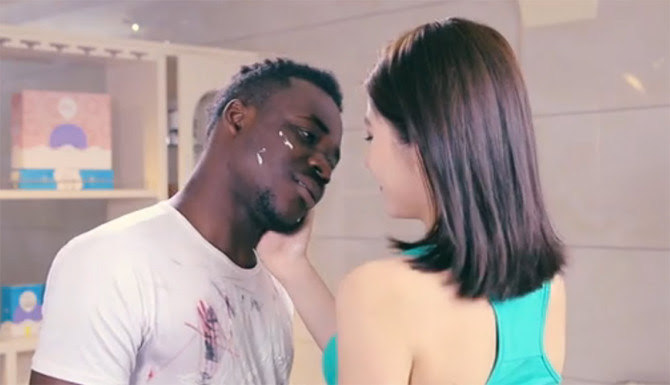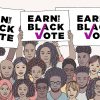By: Milton Washington
 Scene from commercial for laundry detergent that aired in China YouTube screenshot
Scene from commercial for laundry detergent that aired in China YouTube screenshot“Now the Chinese are talking s–t about us, too?” My friend Keba semiwhispered, wide-eyed, leaning into her MacBook Pro. We were sitting side by side in the café, and she had just complained about how much time Facebook was sucking.
“What happened?” I asked without turning away from my screen, brow wrinkled, frustrated from my writing assignment.
“This Chinese detergent commercial is so racist!” she said as she pivoted her screen my way. “Why are they f–king with us?” she asked, squeezing her shoulders, with open palms pointing at her screen.
“Because like everywhere else in the world, they’re scared of the black d–k, too,” I said matter-of-factly.
“Oh my God, Milton, you’re so right! They are!” she said.
Because the Chinese are so thirsty for energy, they’re all over Africa. There’s about to be a bunch of Chinese-African babies in a minute. But it also means that Africans are all over China now. Did you notice that the black guy in the commercial was African? Who’s the audience for laundry detergent in China? Women, right? I have little doubt that commercial was intended as not-so-subtle messaging that black men are bad, black is dirty, as in, “Now hear this, now hear this: To all of the women of China, do not give up the goods to the African man. If you do, he will soil your womb.”
Wow … pretty rough, right?
But it isn’t new, and good ole Uncle Sam had a lot to do with how Asians perceive us black men.
Homogeneous Asian countries like Japan, Vietnam and South Korea had limited exposure to black folks until the U.S. military set up bases. When the bases went up, local populations were told that black folks were dangerous devils with tails and black d–ks that were death sentences to reproductive parts, soiling the womb forever.
Yeah, “soiling the womb.”
Hell, if I were a 5-foot-2, 140-pound Asian man who’d never seen a black person, and when I did, he looked big and strong enough to destroy my home with a single punch, and my wife, girlfriend or daughter was afraid of him but seemed to want some of that blackness, I’d want him and his black d–k out of my country, too. Needless to say, Asians bit hard on those American narratives.
You might be wondering who is this Milton guy, and how does he know this?
Historian?
Anthropologist?
Not even close.
I’ve gotten kicked out of two universities but eventually graduated from Indiana University with a Bachelor of Science in business. However, I know a little something about this because, even though I’m a black man (older black women think I look like Yul Brynner from the King and I, while some younger folks say I look a bit like the Rock), I was born in South Korea: first mother, first culture, first language. My mother was a prostitute who was forced by the U.S. military to choose the color of the soldier she’d serve.
Wait … what?
Yeah, that’s right: She and her girls had to choose the color of the soldier they’d serve.
I was 6 years old, in 1976, when my mother and I moved from the countryside to the camp town—a Korean town that revolves around a U.S. military base—called Bupyeong. We lived just outside the front gates of Camp Market, at the beginning of the red-light district where my mother worked. I saw her transform from a traditional Korean woman with straight black hair and standard Korean garb into a woman with tight dresses, fishnets and Afro. As boss—a madam, a mommassan—she led a group of girls in an all-black club that had been formed after the military was “desegregated” in 1948.
One night I saw my mother and her girls get arrested at her nightclub. She screamed at me from the back of the police wagon, telling me to stay put for two weeks. That was the first time I spent days alone; I was 7. I always wondered where she went and why. Recently, I discovered that the answer is connected to fear of the black d–k.
She was arrested by the South Korean police and incarcerated in a military lockup called a monkey house. Not only were the women incarcerated, but they were also quarantined. Because they were suspected of having sexually transmitted diseases, they were forced to undergo therapies for two or three weeks. That’s what all of this was about: STDs.
According to a soldier who was stationed there in the ’70s, the U.S. military said it was the black soldier, the black d–k, that was responsible for spreading the STDs. So in order to keep the military healthy, it required the desegregated force to segregate when it came to sex. To maintain separation between black and white soldiers, the military reportedly required the girls to be aesthetically obvious to the soldiers they served. The girls who worked with the black men wore Afros and spoke like the black soldiers, while some of the girls who served the white soldiers wore cowboy boots and hats.
So back to the dumping of the dirty African into the wash cycle to produce the clean Chinese guy—some of the blame simply goes to our good ole Uncle Sam.
Born in South Korea, Milton Washington was adopted and in 1979 was brought to the U.S., where he learned English and also learned about American culture. Today he lives in Harlem and operates a creative agency while completing his memoir, entitled Slickyboy.














